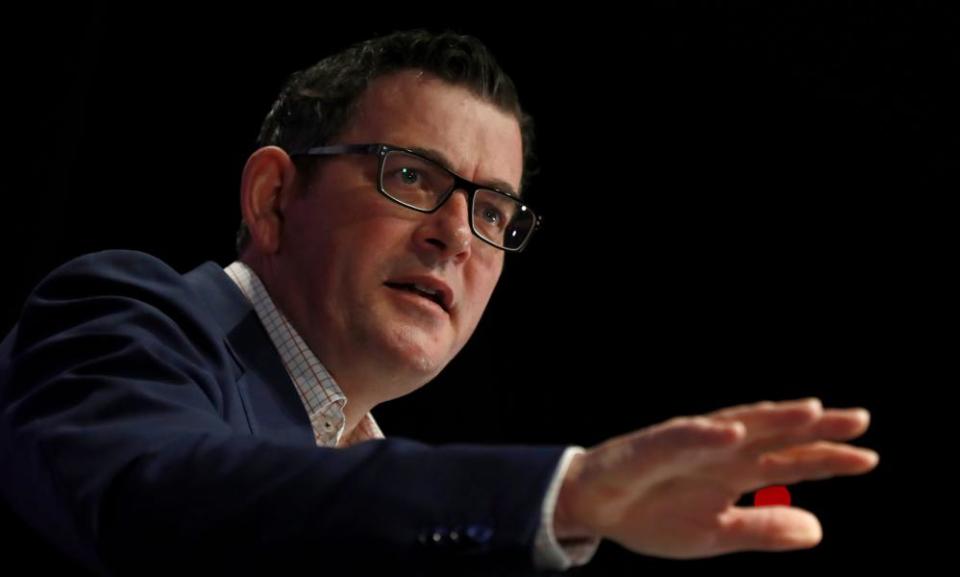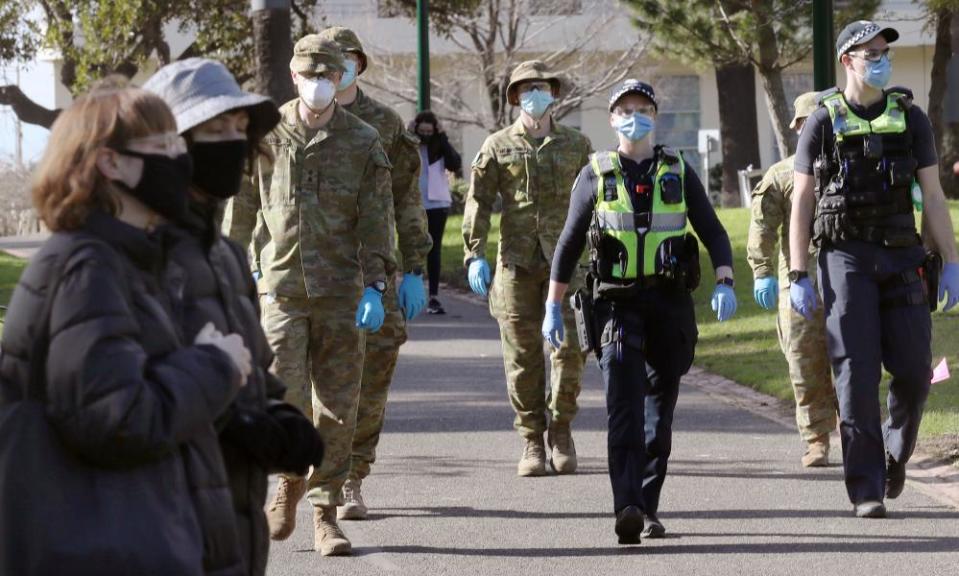Daniel Andrews fronts the media every day – but could his government be more transparent?

Be careful Victoria.
Be careful Daniel Andrews. Now may not seem to be the time to be cautious, to take a breath. It’s so urgent and furious and frightening. We’re in “stage four” – constantly being redefined – and there is no “stage five”.
“There is no alternative,” Andrews said on Sunday when announcing a night curfew for Melbourne, a restriction on movement to within 5km of your home and stage 3 restrictions for regional Victoria.
The following day it was a shutdown of large chunks of the economy, to cost an estimated 250,000 jobs. Tuesday was about enforcement – hundreds more defence personnel on the streets and knocking on doors and a huge increase in fines for breaching regulations, from a $1,652 on-the-spot penalty to $5,000.
Related: Melbourne stage 4 restrictions and Covid lockdown rules explained
This is a crisis, a “state of disaster” in legislation as well as mood. As of Wednesday, 162 have died in the state, and 538 people are in hospital. We have to do everything possible to bring the numbers down and most accept that the economy will be badly damaged but won’t recover unless and until the health crisis is solved.
The way the government is doing that is through drastically reducing the number of people moving around. That’s to drive down the number of people an infectious person comes into contact to, and therefore could infect. That’s the strategy.
No argument with any of that. Yet as a resident of Melbourne, let me worry a little. So far, premier Andrews has personally fronted 34 consecutive days of media conferences. He reports the latest day’s cases – another 725 on Wednesday. He goes through the deaths, dominated by people linked to aged care homes – the dangerous “mystery” cases with no known source of transmission. And new rules, always new rules.
You can say it’s his job to turn up, and it is, but there’s something gritty about Andrews. His government may have made serious mistakes in hotel quarantine that contributed to this disaster, but he will doggedly see this through. Like him or not, he’s a leader.
The press conferences go on and on, and it’s become an in-joke that he won’t leave until every question is answered. “Any more questions?” he says, and someone pops up with something and he returns to the lectern. “See you tomorrow,” he says at the end.
In recent days, his rhetoric has grown increasingly angry about a few people not “obeying the rules”. That’s understandable, as is the frustration of Melburnians furious that they are doing the right things, but some others are out after 8pm, or driving 30km to McDonald’s, or not staying home when they’ve been tested or when found to be Covid positive. Who are these people? What are they thinking?

It is shocking that when defence and health workers knocked on 3,000 doors of people who were supposed to be isolating, 800 were not at home. Some might have a valid excuse, but many did not. So now they will be banned from exercising, and face penalties of $5,000, “the largest on-the-spot fine on the statute books in Victoria”, Andrews boasted. It could be up to $20,000 for repeat breaches pursued through the magistrates’ court.
“Those Victorians – the vast majority who are doing the right thing – are becoming, like me, increasingly frustrated at people who aren’t. That’s why we ask you to make the right choice, to make better choices, and frankly – given the odds of getting caught – make smarter choices.”
Some were surprised that people in isolation could ever exercise, but days before when asked, the chief health officer, Brett Sutton, had a different view. It is “clear that if you are not giving people an option to exercise, then you are effectively putting them in prison and that is not something that can be done for a case of coronavirus or for anyone else”.
A punitive approach suits Melbourne’s mood right now, but how helpful is it? Are we allowed to ask? Will people – many out of a job, presumably – be able to pay these fines? The police commissioner, Shane Patton, said it wasn’t his concern if people paid fines or not.
We have little information about who is flouting the rules, how old they are, where they live, or what gender they are. How many people who have tested positive and are not at home have been fined, or are suspected of passing on the virus? Little enforcement data is provided, apart from a few dot points from Victoria police about the latest transgressions.
Related: 'It has to work': the reins are tightening on a Covid-stricken Victoria, but how did we get here?
But if you go back to the first lockdown, the Age reported in May that Victorians had been fined for breaking coronavirus rules at almost triple the rate of any other state or territory, with almost 6,000 people receiving a $1,652 penalty. And, at that point, just over 2% of the fines had been paid.
Andrews is a socialist left Labor premier, but his record on law and order is “lock ’em up”. He has embraced higher jail terms, less discretion for judges and new prison beds.
But something else must be going on here. The surgeon Dr Neela Janakiramanan told The Drum that a 5% non-compliance rate is expected in public health interventions, but a 20 or 30% rate as Victoria is reporting is something strange. They are not all “sovereign citizens” that Patton mentioned – the tiny number of ranters who don’t believe the law applies to them. It’s either that they don’t know the rules, or they are making what they think is a rational decision for reasons of their own, she said.
“It means that no amount of policing is going to enforce them to do it.”
Ian Hickie, a professor of psychiatry at the University of Sydney, says research before the Victorian outbreak conservatively estimated that there would be a 14% increase in suicide rates due to Covid-19 restrictions nationally. The reasons for such a mental health crisis – job losses, social isolation and dislocation, the disruption to education – are intensified in Melbourne and Victoria.
“An over-emphasis on top-down, law-and-order directives has limited and short-term utility for achieving the required behaviour changes. Often, it has the reverse effect to that intended,” he wrote.
What was required were “public health messages that engage people to be community-minded and active in their local settings to support and care for each other in really testing times”.
All this may sound namby-pamby to many, but the finger-pointing also avoids the tougher questions. We all have to do everything we can, but look at the figures. It’s aged care – a fifth of all active cases. It’s spreading through meatworks and other places of insecure work. It’s healthcare workers who are falling ill, and pandemic leave has only now been introduced. That’s where the crisis is and, to be fair, the government is throwing everything at that, too.
But on what advice was a curfew – the first in Melbourne’s history – deemed necessary? What are the details of contact tracing? How long is tracing really taking? How many people testing positive had no symptoms? How many are close contacts of known cases?
The epidemiologist Tony Blakely from the University of Melbourne said recently that if more information was released it would help Victorians better understand why the cases continue. “We don’t want to just be berated about behaving badly,” he told the Age.
“We want to know why [the cases are increasing] ... how we can fix it. Everybody needs to feel like they are in the control room.”
The government has given itself huge powers under its state of disaster declaration. That’s probably OK, because these are extraordinary times. But as the honorary professor at the Australian Studies Institute at the Australian National University, Colleen Lewis, says, “fundamentally the difference between a democracy and a dictatorship is accountability, and that always comes back to the people”.
She’s talking about parliament, which after sitting briefly in June, was again cancelled this week, on Sutton’s advice. Surely, our parliamentarians are “essential workers” and something can be put in place to enable them to sit safely, with fewer numbers, wearing masks. As the Liberal leader, Michael O’Brien, said: “If Dan Murphy’s is an essential service, I think democracy is pretty central as well.”
The opposition and crossbench-dominated upper house did sit for a few hours this week, defying the advice. The health minister, Jenny Mikakos, was asked several questions and refused to answer any of them, saying she would provide written answers the following day. It was, in parliamentary terms, contemptuous.
These issues might not worry too many Victorians, desperate to see these numbers go down. That is the priority, but we still need to care about how we do it. Andrews, never sleeping, never taking a day off, driving himself to exhaustion, will one day stop, and be accountable for all of it.

